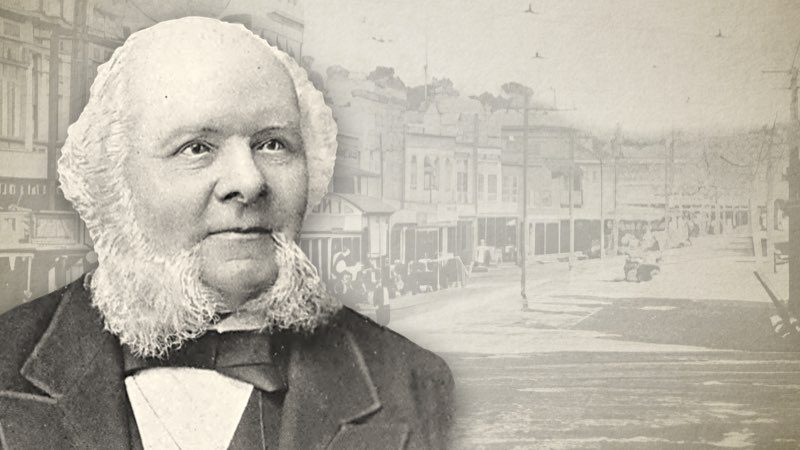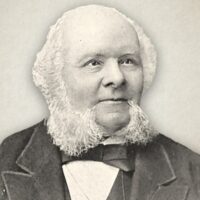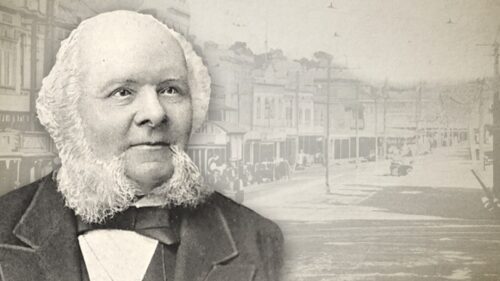
A Calendar For The Latter Half Of The Year 1850
July witnesses the trees full of sap; and may it be the experience of the dear reader, to be full of the sap of divine life, strictly avoiding all nourishment but that which is gained from the fulness of Christ, for there is such a thing as the unprofitable sustenance of self-righteousness, that brings forth “uncircumcised fruit” (Leviticus 19:23). Unto Cain and to his offering the Lord had not respect, because it was the fruit of the ground. Everything at this season of the year seems full of life and activity, but whatever examples of industry and perseverance we may have, all such working cannot produce life, but only gains us the fruit of our labour; the vital principle within is the cause of life, nourishment of the body sustains that principle which requires to be fed with spiritual food, this begets works of righteousness, which is fruit unto holiness acceptable to God. “Not by works of righteousness which we have done, but according to his mercy he hath saved us by the washing of regeneration, and the renewing of the Holy Spirit, which he shed on us abundantly, through Jesus Christ our Saviour, that being justified by His grace (not by our works), we should be made heirs according to the hope of eternal life.”
August is called the harvest month, which reminds us of the fast-approaching harvest, when a people whose sins are ripe for judgment, will be cast down for the eternal burning, while the great Lord of the harvest will fulfil his promise, “Lo I will command, and I will sift the house of Israel among all nations, like as corn is sifted in a sieve, yet shall not the least grain fall upon the earth.”
It is a grievous sight to behold fellow-creatures upon the verge of eternity, entering with avidity into the vanities and trifles of the wilderness, apparently without a glimmer of light upon the darkened pathway, to show them the abyss before them, while not unfrequently a long career of vanity and sin is thought to be atoned for, by the awful act of taking the Holy Sacrament on a death-bed. However such an action may be thought by ungodly relatives and the deluded persons, to be a key to the kingdom of heaven, the door of that celestial place is bolted against such, by this fearful condemnation, “The light shall be dark in his tabernacle, and his candle shall be put out with him.” Reverse the scene, and picture the pleasing spectacle of an aged saint, ripe for glory, whose tabernacle has been sanctified by the great Melchisedec, and who, standing upon the brink of the grave, fears not the command, “Put in the sickle, for the harvest is ripe.” What a mercy to be a living tree in Jehovah’s garden, for such trees He trains, waters, shines, and smiles upon, and finally transplants them to a better country. Death is gathering in daily its harvest, the sickle cuts down the golden grain and the tares together. Is our root-hold in the Rock of Ages, or on the sand of time? Are we alive to God through our Lord Jesus Christ, or dead in trespasses and sins? When the gathering in of the fruits of the earth is effected, it is a time of rejoicing and gladness, and will there be joy in heaven when we are gathered in? Are we ripe in grace or in sin? are matters of deep moment to all. Looking forward to the end is the ungodly’s terror; looking forward to the harvest is the believer’s exceeding joy—no more trials, no more troubles, no more tempests, no more tossings, no more temptations, no more toiling, no more turning away from the smiles of Jesus—and here may our contemplation of heaven be concentrated; Jesus eternally smiling upon us, what more can we desire? With such a prospect, the aged Christian must long to get to the end of the pathway, and his song doubtless is—
“Lord, I long to be at home,
Where these changes never come,
Where the saints no winter fear, Where ’tis spring throughout the year.
“How unlike this state below,
There the flowers, unwithering blow,
There no chilling blasts annoy,
All is bloom, and love, and joy.”
September.—The labour of ploughing associates itself at once with this month. Dear reader, to what plough have you got your hand? Is it the plough of engagement in God’s service? or, are you ploughing away with the oxen of Achan’s camp? If the latter, “May Judah plough into your heart, and Jacob break the clods,” under which all self-sown seeds will assuredly rot. The great Boaz never sows the precious seed of divine grace, until he has ploughed up the clods of creature works and self-righteousness, and everything else that cleaves together in the stubborn soil of human nature. It is the divine operation of the Holy Spirit, to prepare the heart for the seed that can never perish, ploughing up depravity therein, settling the furrows thereof, making it soft with showers. It is Jehovah that enrichest it with the river of God, which is full of the water of eternal life, blessest the springing thereof, and crownest the full-grown plant of His own right hand planting, with the consummation of His goodness, by gathering it into the garner of His love. If the dear reader is not manifesting daily growth in the divine life, may he have everything rooted up that hinders it, that he may rise higher and higher, free from the many thorns that are the fruit of sin, and shake off everything that prevents the budding forth of the graces of the Holy Spirit. And may it be marked of the dear children of God, this year, and every year, that “their blossoms shot forth, and clusters thereof brought forth rich grapes,” that the Master of the vineyard may be able to say, “I found Israel like grapes in the wilderness,” and not have cause to add, “but they went to Baal-peor, and separated themselves.” May there be such unity of the Spirit, such growing together, as brethren of the household of faith, such peace and prosperity in Zion, that it may, be said of every Christian Church, “The place was called the field of strong men,” so that, when we lift up our eyes, and look on the fields, we may see that they are white to harvest, every plant being fastened firmly to everlasting securities, fixed on the sure foundation of electing love, grafted into the living vine, a branch of the root of Jesse, Christ in them the hope of glory. No other standing will do; however promising the exterior, “their root shall be as rottenness.”
October witnesses the rough wind scattering the leaves of the trees. The powerful operation of God’s Spirit will strip the believer of every decoration; nor can carnal power, though extended to the utmost, resist the divine force of this spoiling operation. However seemingly uncertain in its effects, and changeable in its quarter, the natural wind is (though even such changes and effects are ruled by Jehovah, who rideth upon the wings of the wind, and assuages the storm at his pleasure), “the full wind” of his sovereign power, in the imparting life divine, is like the coming in of an army, destroying all before it, utter desolation takes place; but after the “holy seed” is sown, and the tree is growing up, every leaf it puts forth from the spiritual nature is an evidence of divine grace within, and such leaves, it is written, shall not wither. When Noah sent forth the dove out of the ark, the dove came into him again, and “lo, in her mouth was an olive leaf.”
This passage is peculiarly sweet, “Lo, in her mouth was an olive leaf.” Jesus is the meek, harmless, innocent, and loving dove, that brings the olive leaf of good tidings to us, that the wrath of our God is assuaged by the sacrifice of himself; and through his blood are we cleansed from all sin. What balm and consolation there is in this olive leaf, it tells us that there is the high ground of eternal safety in Christ Jesus, and that He has brought us out of the deluge of iniquity, and set us upon the high mountain of his eternal love. And what language can express the nature of Jesus’ love? It must be felt to be understood. Let us lift up a banner of praise upon the eminence of Christian experience, that it may be seen we fight the good fight of faith, and are on the Lord’s side.
November brings to our recollection the barren and sterile state of unregeneracy, when the soul was in total darkness, and buried in wilderness attractions and vanities. Any attempt on our part did not raise us from that low estate; but the Lord Jehovah, in his sovereign pleasure, “looked upon us,” and his look of love leads to the washing away of our pollution, and anointing us with the oil of gladness; and, however uncomely before, we are raised to such an elevation, that the Lord God has declared, that “we are perfect through the comeliness which He hath put upon us.” But this inactive season furthermore reminds us of the gloom and depression often experienced after the divine change has been produced; long days of soul darkness, “days of clouds and of thick darkness;” no sun, no smiles, no delight, no growth, but the experience of being buried in apathy. Such seem to be seasons wholly unprofitable to the soul; and yet it is a question if they are so, for when the Sun of Righteousness breaks forth with smiling splendour again, and warms our souls to spiritual action, comparison and contrast increase the delight, increase the praise, and increase the wonder and admiration. Not that dark seasons are to be desired, only as the Lord has numbered our steps, everything we meet with must be for our good. God forbid that we should know what declining steps are, in the way of the Lord, but may we have the experience of believing that Jesus is behind the cloud, though we cannot see Him.
December brings us to the end of our meditative pathway. When it literally arrives, if you and I, dear reader, should, in the order of God’s providence, be spared, may we be enabled to look back upon a year of blessed experience. In the changes of the seasons, as alike in everything that is moved by the wonderful power of an invisible God, his unerring wisdom is displayed; but whatever amount of almighty wisdom may be developed in the vast field of nature, and in the works of creation (of wisdom, with all our researches, we know of but a small part), still when we attempt to carry our contemplation from nature to grace, and to study that which is of infinite importance to our souls, our natural powers at once fall useless, and a higher capacity must be imparted ere we can mount the first step of the stupendous scheme of salvation—so stupendous, that let the child of God employ every moment of his life in the study of its heights and depths, and there will be beauties untold, and depths unfathomed, and yet so simple that it can be grasped by the hand of faith: and a comprehension of its fulness and all-sufficiency be understood and appropriated in the one blessed, precious, heart-cheering, soul-enlivening name, “Jesus.” Be taught by the Holy Spirit the signification of that endeared name, and there is nothing in the work of righteousness but what is therein. The blessed fact is apparent that, turn to whatever point you will in the grand scheme of salvation, Jesus is prominent— dig deeply into the Divine work, and he is the foundation—enter it, and he is the door. Let comparisons of its wonders be made (as we have feebly attempted to do in these humble reflections) to things familiar to the natural eye for more ready conception, and all description and comparison must fail, if Jesus is not marked as principal. He must be seen to be the chiefest among ten thousand and the altogether lovely, or he is dishonoured by the portraiture. He must be reckoned the source from whence all spiritual joy flows; or, to call it joy is a misnomer. To him must be attributed the whole work of righteousness, otherwise it could not be a righteous work. “For of him, and through him, and to him are all things, to whom be glory for ever.” Amen.
George Cowell (1822-1884) was an Independent sovereign grace preacher and author. He also served a short time as editor of the Gospel Magazine.




